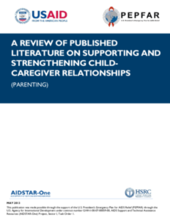This paper presents a comprehensive literature review of evidence-based parenting programs from around the world. The report reviews published literature from 2000 to 2012 and summarizes empirically based recommendations for supporting and strengthening child-caregiver relationships in the context of AIDS and poverty. The review is not limited by geographical scope, but draws on what are considered universal features of children’s development and their relationships with caregivers, though specific variables may be influenced by cultural and local context. The review takes into account the broad body of research on supporting and strengthening child-caregiver relationships and parenting in order to extract general principles to guide discussions on the implementation of parenting programs in contexts affected by HIV and AIDS and poverty. While referring specifically to “parents” and “parenting,” this summary acknowledges that children in many non-Western cultures are parented by relatives other than, or in addition to, their biological parents, and often by more than one person with whom they have intimate and secure relationships. Therefore, the term “parenting” in this review describes the long-term relationship through which one or more adults provide care and protection for a child.
The review found that there is strong evidence of the effectiveness of parent support programs that address a range of child and family concerns, and that the core elements of many parenting and caregiving programs can be adapted for use across different settings and cultures. The summary states that support for parenting is helpful because HIV and poverty challenge both children and families; parenting programs need to be situated within a broader context of improved supports for caregivers and families; social support is a core component of many successful parenting interventions; and that parenting support can be provided in low-income, HIV-affected settings using a set of common elements or principles that have been shown to be effective in parenting programs. The common elements identified in parent support programs include: information, positive parenting, understanding, promotion of pro-social behavior, and responding to parents’ needs. The paper also provides background information on families, parenting and HIV, a description of common features found in successful parenting support interventions, recommendations for developing effective parenting support programs, and the authors’ conclusions.
©Commissioned by USAID, PEPFAR and the AIDSTAR-One Project

